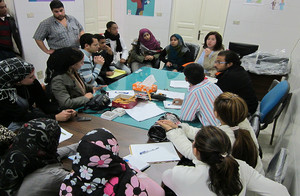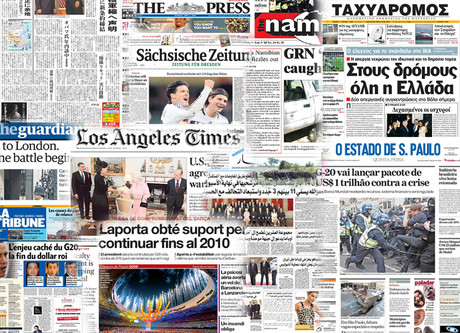“Everyone was on the move, everyone was talking in protest and making their voices heard,” said Farag about the rush of energy and debate sparked by the revolution. “That emerging market was right there, and so was I.”
Her idea was novel in post-revolution Egypt. Welad Elbalad distributes papers once a week in seven communities. Each team is made up of locally trained journalists that zoom in on the news happening in their community. The local editorial teams have a lot of autonomy, though they receive training and feedback and editor-in-chiefs attend monthly meetings at the Cairo headquarters.
“With all the political turmoil there's really a sense of urgency that we need to gain as much ground as possible,” said Farag, explaining the recent push to add new printed editions and move content online. “Where there is a potential, we try and establish ourselves because no one really knows what is going to happen just a couple of hours down the line,” she said.
From all corners of the large, diverse country, the weeklies and online presence reflect the distinct character of each community. Coverage extends from the second-largest city Alexandria, to Dishna El Youm, a rural southern town, to most recently, Marsa Matruh along the northern Coast that strongly identifies with the country's western desert tribes. The Fayoum Oasis west of Cairo and the touristic town of Hurghada on the Red Sea also launched in January 2012.
While the company is expanding, Farag realised that she needed to expand her business skills to secure a sustainable future for her company.
“I've been a journalist all my life and I think like one to a great extent,” said Farag. “Making that mind shift that now you're also a business person and you need to think in different terms is something that I didn't really understand on a day-to-day basis.”
However, this is changing with her participation in WAN-IFRA's Media Professional Programme (MPP). Over the past year, she has developed her business skills, including creating a business plan, choosing templates and learning how to expand readership and market shares. The programme links media editors and managers with international and regional experts to help build leadership skills and develop business strategies with lasting results. The programme also brought her to WAN-IFRA's World Newspaper Congress in Kiev and to Kuala Lumpur in November 2012, where she exchanged ideas and solutions with colleagues from Southeast Asia and the Middle East.
In the Egyptian context, where state monopolies and big business have stunted a countrywide development of media entrepreneurship, the exchange of ideas among media colleagues facing similar problems in different settings has helped her develop a comprehensive business plan. “Being plugged into a more international body of experience has been critical,” Farag said.
Welad Elbalad Media Services is a project of firsts. From journalist to businesswoman, Farag is learning how to create a sustainable media company. At the same time, the hyperlocal news model is giving voice to people that had long been left out of the national media and debate.
Take the company's new community paper set to launch this month in Fayoum, traditionally known as a fundamentalist stronghold west of Cairo. “Pretty much everyone writes it off as some place where no one can do anything,” Farag said. But after traveling to the region and meeting with locals, Farag found a different reality. “We're hoping our publications will give voice to the complexity that really exists right now.”
Alexandra Waldhorn





